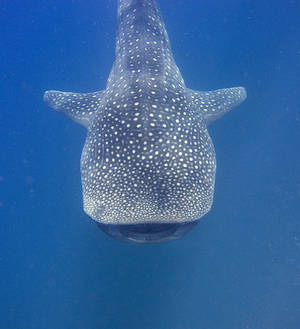Scientists in Mexico have discovered the largest mass gathering of whale sharks in the world.
 These gentle giants can grow up to around 12 metres or 40 feet in length, which means spotting just one of them as they cruise the oceans is an unforgettable experience. Imagine what it must be like spotting a gang of more than 400 whale sharks?
These gentle giants can grow up to around 12 metres or 40 feet in length, which means spotting just one of them as they cruise the oceans is an unforgettable experience. Imagine what it must be like spotting a gang of more than 400 whale sharks?
That's what a team of researchers from Mexico and the US did back in the summer of 2006, when the huge aggregation site, which they've named Afuera, was spotted from a plane flying off the coast of the Yucatan Peninsular in the Caribbean Sea. Since then they've been back each year to carry out studies from the air and in the water to try and figure out what's going on. And in 2009, they spotted the largest aggregation of 420 sharks in an area covering just 12 square km.
The big question is, why do whale sharks do it?
When any animals group together en masse there are really only two possible explanations: sex or food. And in the case of the whale sharks at Afuera, and elsewhere, where other, smaller aggregations form, it turns out it's the latter.
Whale sharks gather at Ningaloo Reef in Western Australia to feed when the coral reefs undergo mass spawning. At another aggregation in Belize, whale sharks are after the eggs of Dog snappers that also spawn in aggregations.
At Afuera, the research team sieved the sea for plankton and found that is was awash with fish eggs. And DNA barcoding revealed that they're a type of tuna called the little tunny. These eggs come packed with fats, making them superb whale shark food. And it's thought that the reason the tuna show up and spawn in this spot is thanks to the upwelling along the coast that injects a pulse of nutrients into the ecosystem.
There's another, smaller aggregation close to Afuera that's been known about for a few years and has recently been protected by the Mexican government. That one already draws in flocks of tourists who - quite understandably - are keen to swim with the biggest sharks in the ocean.
But researchers are worried that this could cause problems with collisions between sharks and high-speed boats. So they're calling for swift action to protect the animals in this extraordinary natural event, and so hopefully they'll still be there for generations to come.
Find out more
An unprecedented aggregation of whale sharks, Rhincodon typus, in Mexican Coastal waters of the Caribbean Sea










Comments
Add a comment